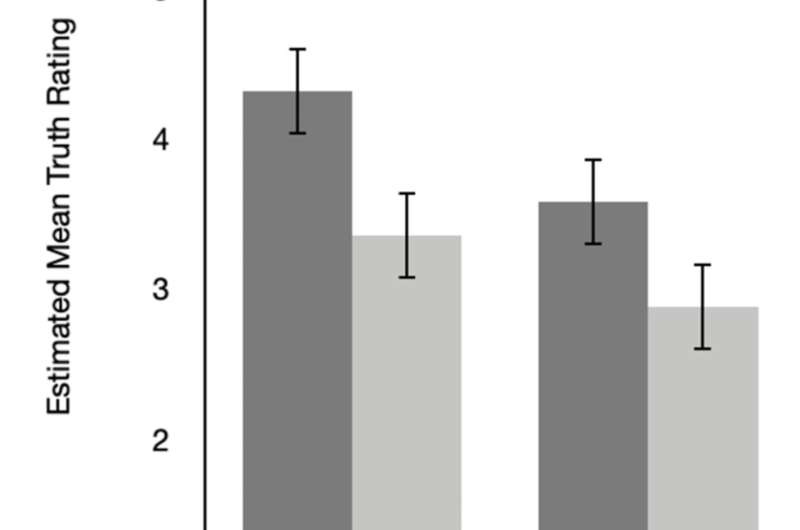
Estimated mean truth ratings across repetitions (repeated, nonrepeated) and claim type (science-consistent, skeptical-aligned) in Experiment 1. Note. Error bars indicate 95% CI. Credit: Jiang et al. 2024, PLOS ONECC-BY 4.0 (creativecommons.org/licenses/by/4.0/)
Supporters of climate science rated climate-skeptic statements as “more true” after just a single repetition, according to a study published Aug. 7, 2024, in the open-access journal. PLOS ONE led by Mary Jiang of the Australian National University, Australia, and co-authored by Norbert Schwarz of the University of Southern California, USA, and colleagues.
The results were true even for the strongest supporters of climate science surveyed.
Among the flood of content a person consumes every day, the principle of motivated cognition suggests that they are more likely to find truth in statements that reflect their beliefs. However, a second phenomenon, the illusory truth effect, suggests that only repeated exposure to an idea—no matter what it is—can heighten its perceived validity.
Schwarz and colleagues examined these ideas in the climate science arena, questioning how self-identified supporters of climate science might react when repeatedly exposed to climate-skeptic claims. Would the repetition have an effect despite the conviction of their beliefs?
The researchers set up two similar experiments, the first involving 52 participants and the second 120. At least 90% of participants in both experiments endorsed climate science: the scientific evidence of human-caused climate change.
Participants reviewed a series of statements classified as skeptical, climate, or weather-related filler statements. After 15 minutes, they considered a second set of claims, half of which were repeats of previous statements.
They rated the claims from “Definitely True” to “Definitely False” on a six-point Likert scale. In Experiment 2, participants also classified each claim as aligned with scientists or skeptics and determined their climate views using the Six Americas Super Short Survey.
In climate science supporters, repetition increased the perceived validity of all types of claims—including those that participants retrospectively marked as antithetical to their beliefs. This was true even for the strongest supporters of climate science, those participants who self-identified as “alarmed” by climate change.
These results reinforce the benefits of truth reinforcement with repetition and the dangers of spreading false information, the researchers write. They suggest that further studies include non-climate issues (eg, immigration, education, health care, etc.), experiment with time spans and replication rounds, and reverse the experiment to study how climate skeptics influenced by the repetition of climate-supporting claims. science.
Lead author Mary Jiang adds, “People find climate skeptics’ claims more credible when they are repeated only once. Surprisingly, this increase in trust as a result of repetition occurs even when people identify as a strong supporter of climate science. “
More information:
Repetition increases credence in climate-skeptic claims, even for supporters of climate science. PLoS ONE (2024). DOI: 10.1371/ditar.pone.0307294
Provided by the Public Library of Science
citation: Experiment Shows Repetition Boosts Belief in Skeptic Climate Claims, Even Among Climate Science Supporters (2024, August 7) Retrieved August 7, 2024 from https://phys.org/news/2024-08-repetition-boosts- belief-climate-skeptic.html
This document is subject to copyright. Except for any fair agreement for study or private research purposes, no part may be reproduced without written permission. The content is provided for informational purposes only.